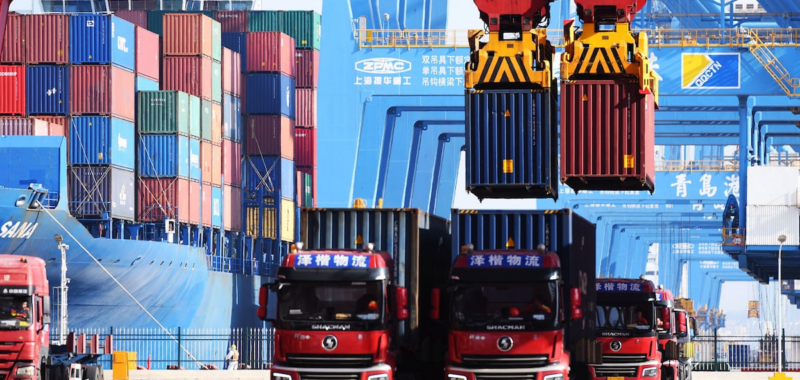
President Donald Trump said he planned to impose previously threatened tariffs of as much as 25 percent on Mexico and Canada by Feb. 1, reiterating his contention that Americaâs two immediate neighbours are letting undocumented migrants and drugs flood into the country.
âWeâre thinking in terms of 25 percent on Mexico and Canada, because theyâre allowing vast numbers of peopleâ into the US, Trump said in response to questions from reporters in the Oval Office on Monday night. âI think weâll do it Feb. 1.â
Trumpâs plans for tariffs on two nations vital for US energy and auto imports threatens to set off a trade war among the signatories of the US-Mexico-Canada Agreement, the successor to Nafta negotiated at Trumpâs insistence during his first term. The pact governed the flow of $1.8 trillion in goods and services trade, based on 2022 data.
Both Canada and Mexico have said theyâd retaliate against American goods if Trump slaps tariffs on them. The USMCA is up for review in 2026.
âCanadaâs a very bad abuser,â Trump said, complaining about the current of fentanyl and migrants across the northern US border.
The dollar jumped against most major currencies following Trumpâs remarks. Bloombergâs dollar gauge rose as much as 0.7 percent, the most since Dec. 18, as investors sought the safety of the worldâs reserve currency. The Canadian dollar and Mexican peso fell as much as 1.4 percent each against the greenback on the news.
There was some relief in Chinese markets as Trump fell short of announcing immediate levies against the worldâs second-largest economy.
An index of Chinese stocks traded in Hong Kong rose 1 percent, while gauges in the mainland fluctuated. The offshore yuan slipped 0.2 percent, but held on to most of its Monday rally.
Tariffs of the magnitude that Trump is proposing on the US neighbours would spell âdisasterâ for the US auto industry and Detroitâs carmakers, each of which import a significant number of vehicles from Canada and Mexico, Bernstein analysts said in a November research note. Stellantis NV imports about 40 percent of the vehicles they sell in the US, while General Motors Co. imports roughly 30 percent and Ford Motor Co. 25 percent, they said at the time.
The additional levies would hit about $97 billion worth of auto parts and 4 million finished vehicles that come into the US from those countries, and could boost average new-car prices by about $3,000, according to Wolfe Research.
Trump also indicated he was still considering a universal tariff on all foreign imports to the US, but said he was ânot ready for that yet.â
âYouâd put a universal tariff on anybody doing business in the United States, because theyâre coming in and theyâre stealing our wealth,â he said, adding that implementation could be ârapid.â
In a Nov. 25 post on Truth Social, Trump warned heâd impose 25% tariffs on all Mexican and Canadian imports as âone of my many first Executive Ordersâ and said it âwill remain in effect until such time as Drugs, in particular Fentanyl, and all Illegal Aliens stop this Invasion of our Country!â
Those tactics set off a scramble in Mexico City and Ottawa to demonstrate to the incoming president that both governments were addressing his concerns.
Within days, Prime Minister Justin Trudeau, who has since said heâs stepping down, flew to Florida to impress upon Trump that the number of migrants who cross the countryâs border into the US is small, and that Canada is also working closely with the US to stop drug smuggling.
Canada has also drawn up an initial list of C$150 billion ($105 billion) of US-manufactured items that it would hit with tariffs if the first salvo comes from Trump, who has taunted Canadians with an invitation to become the 51st US state.
âNone of this should be surprising. The one thing weâve learned is that President Trump at moments can be unpredictable,â Dominic LeBlanc, Canadaâs finance minister, told reporters shortly after Trumpâs comments.
The Canadian government will keep talking about border security and other issues with the Trump administration, LeBlanc said. âIn our conversation with American officials, we have spoken about our shared commitment to the fight against fentanyl, to ensuring that immigration is orderly and legal.â
In December, Trudeauâs government presented a plan to spend about $1 billion on additional measures such as more helicopters and drones for near the border.
Mexico has sought to avoid the imposition of tariffs, taking actions to placate Trump including seeking to reduce imports from China and carrying out a record fentanyl seizure.
Mexican President Claudia Sheinbaumâs government has said the tariffs could affect the $800 billion of annual trade between the countries and would potentially drive inflation in the US.
By Josh Wingrove and Eric Martin
Learn more:
Will President Trump Redraw Fashionâs Global Sourcing Map?
Manufacturers in Asia, Europe, Latin America and Africa are bracing for new tariffs which could radically shift trade flows as brands in the US move supply chains and deploy complex contingency plans.

